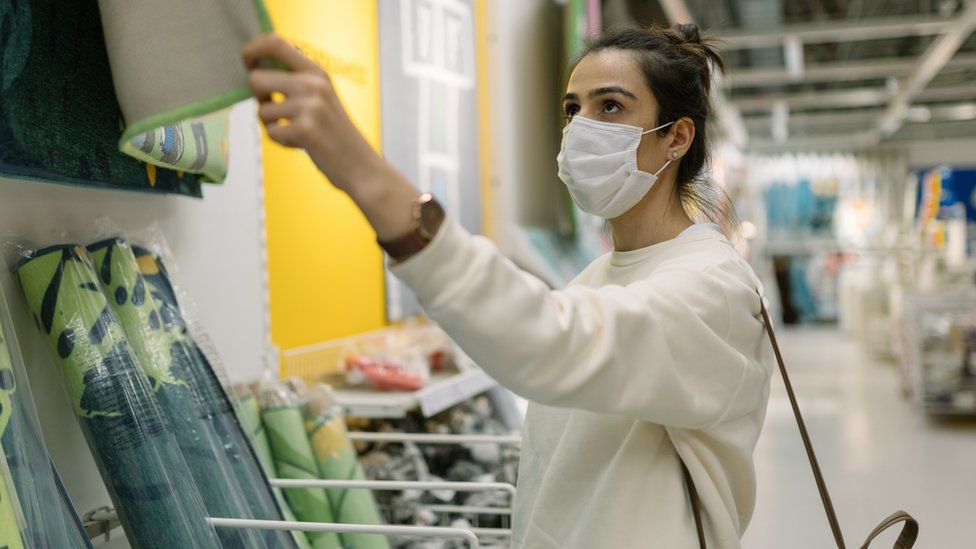UK shop sales continue to fall in September
- Published
- comments

Retail sales fell for the fifth month in a row in September, with people spending less in shops despite Covid restrictions easing in the summer.
Sales dipped by 0.2% in September, following a 0.6% drop in August, according to the Office for National Statistics (ONS).
Non-food stores were hit hardest by the decline in sales, with customers buying fewer household goods and furniture.
In contrast, fuel sales rose by 2.9%, pushed up by a spike in demand.
Darren Morgan, director of economic statistics at the ONS, said: "Household goods were the main driver of this month's decline, with a fall of nearly 10%, while food sales ticked back up after falling last month."
He added that petrol sales exceeded their pre-pandemic levels for the first time in September. Petrol stations reported strong sales during the last week of the month after warnings over delivery problems due to a shortage of lorry drivers.
Despite coronavirus-related restrictions being lifted in the summer, shopping in-store remained subdued.
'Bounce back is vital'
Helen Dickinson, chief executive of the British Retail Consortium (BRC), said that shop owners would be "concerned" by the slump in sales in the run-up to the key Christmas trading period.
"For the sake of the UK's economic recovery, it is vital that retail sales bounce back as we near the festive season," she said.
She added that labour shortages across supply chains, warehouses, and factories were all putting pressure on retailers ahead of the festive season.
The proportion of online sales, however, rose to 28.1% in September, from 27.9% the month before - substantially higher than pre-pandemic levels.
Department stores also reported an increase in sales of 4.3%.
Tony Brown, chief executive of New Start 2020, which owns Beales department stores, told the BBC's Today programme that people's shopping habits had changed since restrictions had eased.
"There is not much browsing anymore - people come out, they know what they want, they spend and then they go. It is a different dynamic than what it used to be," he said.
The retailer also warned of a "perfect storm", saying that high shipping costs, additional customs checks because of Brexit, inflation and the cost of fuel increasing meant that additional costs had to be passed on to customers.
Bethany Beckett, UK economist at Capital Economics, said the latest figures suggested the "economic recovery is fast running out of steam".
The fifth monthly fall in sales in September marks the longest continuous drop since records began in 1996, although they remain about pre-pandemic levels.
But Ms Beckett added: "Given the backdrop of continued shortages and rising Covid-19 infections, we suspect that retail sales growth will continue to be weak in the coming months."
In the run-up to Chancellor Rishi Sunak's Budget next week, trade organisations recently called for additional support.
The BRC, in a joint letter also signed by the CBI and UK Hospitality, called for the reform of business rates charged on non-domestic properties, saying that businesses needed help to rebuild after Covid.
- Published20 October 2021
- Published21 October 2021
- Published19 October 2021
- Published19 October 2021